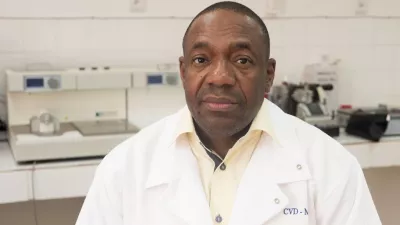WASHINGTON, D.C. – A Malian physician who also teaches at the University of Maryland will receive $100,000 for using health data to save children’s lives through a comprehensive vaccination program.
Dr. Samba Sow generated and used metrics on the disease burden related to Hib – Haemophilus influenzae type b disease – to secure political and financial support to vaccinate thousands of children against the disease. He spearheaded a nationwide delivery campaign for the vaccine, and, as a result, the country has seen an 80% decline in new Hib cases.
The award will be presented tonight at an event in Washington, D.C., and is part of the annual Roux Prize offered by the Institute for Health Metrics and Evaluation (IHME), an independent research organization at the University of Washington in Seattle. Dr. Sow is one of more than 2,700 collaborators who contribute to the Global Burden of Disease study (GBD), which recently celebrated the 20th anniversary of its first publication in the international medical journal, The Lancet.
“Dr. Sow has devoted his career to public health and has distinguished himself in the prevention of deaths and the spread of diseases through vaccines,” said IHME’s Director Dr. Christopher Murray. “It is an honor to bestow upon him the fourth annual Roux Prize recognizing an individual who has used health evidence in bold ways to make people healthier.”
The three previous prizes were awarded to the former mayor of Cali, Colombia, Rwanda’s minister of health, and an epidemiologist in the Philippines.
Dr. Sow studied medicine at the National School of Medicine and Pharmacy of Mali in Bamako, the nation’s capital, and holds a master's degree from the London School of Hygiene and Tropical Medicine.
He established Mali’s first blood culture surveillance system for children younger than 5 years with illnesses related to high fever. Data from that system revealed a burden of invasive H. influenza type b (Hib), pneumococcus and other infections. He later established surveillance systems for pneumonia and diarrhea, and was the leading Malian investigator on a landmark study confirming rotavirus as the leading cause of severe dehydrating gastroenteritis among children in Mali.
Dr. Sow’s Hib immunization campaign followed efforts by GAVI, the global vaccine alliance, to expand the availability of vaccines in various countries.
“We went to see the president in the palace,” Dr. Sow said. “Then-President Amadou Toumani Touré was called ‘the friend of the children,’ and he was shocked. So when we explained to him that there was a possibility to get vaccines through the GAVI system, he said ‘l'm ready to pay now to stop these killing pathogens.’”
Because of his work in promoting the Hib vaccine and his help in responding to an Ebola outbreak in West Africa, Dr. Sow was asked by the President of Mali to serve as the country’s Minister of Health, a post he assumed in April of this year. Dr. Sow also continues to work toward improving health metrics sciences through the GBD project.
“Now that we have opportunities and systems like the GBD, we will have to take that opportunity to strengthen our national system, to question our own data, by looking at other data from other places,” he said.
The Roux Prize was established by David and Barbara Roux to encourage the use of evidence in health decision-making. It is intended for anyone who has applied health data in innovative ways to improve population health. Nominees may come from anywhere in the world and could include, but are not limited to, staff in government agencies, researchers at academic institutions, volunteers in charitable organizations, or health providers working in the community.
Nominations for next year’s prize are due January 31, 2018, and the winner will be announced at an event next fall. Details on the nomination process for the Roux Prize are available at www.rouxprize.org. Nominations and questions about the prize can be sent to [email protected].
Media contacts:
[email protected]
